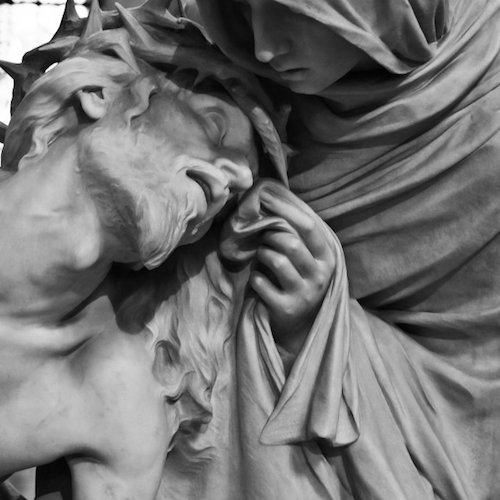We run our website the way we wished the whole internet worked: we provide high quality original content with no ads. We are funded solely by your direct support. Please consider supporting this project.

A Foolish and Weak-Looking God
The New Testament assumes that the God of Israel and the God revealed in Jesus Christ are one and the same God. But there also can be no question that the portrait of God that was unveiled when the Messiah arrived on the scene was in some respects quite different from what the OT had prepared most Jews to expect. N.T. Wright captures the unprecedented impact Jesus made when he notes that, since his coming, the very meaning of the word “God” has to be “again and again rethought around the actual history of Jesus himself” (Jesus and the Victory of God, 661). The new insights that Jesus reveals about the character of the God of Israel is nothing short of shocking.
Undoubtedly the most astounding new dimension of the God of Israel that Jesus unveils concerns the “foolishness” and “weakness” of his voluntary death on the cross on behalf of his enemies (1 Cor. 1:23). Paul’s attribution of “folly” and “weakness” to God constituted a new language of God. Even more it is a new understanding of who God is. The way in which Paul and his communities placed the cross at the center of their understanding of what Jesus revealed about God constituted a transformation in their conception of God. One theologian argues that the revelation of God in the crucified Christ “stands God on the head” (D. Georgi, Theocracy in Paul’s Praxis and Theology, 54). And it is for this reason that we must rethink the very meaning of the word “God” in light of Jesus.
The writer of Hebrews put it this way, “In the past God spoke to our ancestors through the prophets at many times and in various ways, but in these last days he has spoken to us by his Son, whom he appointed heir of all things, and through whom also he made the universe. The Son is the radiance of God’s glory and the exact representation of his being, sustaining all things by his powerful word” (Heb 1:1-3).
In contrast to all previous spoken and written revelations, Jesus is God’s own Son. As is the case throughout the NT, the import of referring to the “Son of God” is not to suggest that Jesus is only a Son and not God himself, but to suggest that he is the very embodiment of God. While God revealed himself in a diversity of ways in the past, only in Christ has God come in person. Torrance wonderfully captures the radically new thing that took place in Christ when he says,
In Christ, what God communicates to man is not something, but his very self. This is distinct from all other acts of God. This is God’s unique act, his reality-in-the-act, and apart from this act there is no God at all….in Jesus Christ God acts in such a way that he is himself in his act, and what he acts he is, and what he is he acts….Jesus Christ as act of God in humanity is identical with God’s own person (T.F. Torrance, Incarnation, 107-8).
Because the weak-looking Jesus who was crucified is identical with God’s own purpose, he is the one who alone is the radiance (apaugasma) of God’s glory (doxa) as well as the one and only exact representation (charactēr) of God’s very essence (hypostasis). Whatever value previous revelations have, they fall short of this. They may to some degree reflect God’s glory, but the crucified Son alone reflects the full brilliance of his glory. They may to some extent represent God, but the Son alone is the exact reflection of God’s character. And they may reflect aspects of God’s being, but the Son alone reveals God’s very essence.
What is more, the crucified Jesus is the one through whom all things came into being and the one for whom everything exists, a view expressed elsewhere in the NT (Jn 1:2; Col. 1:15-17). This means that Jesus is not only the one perfect expression of God’s essence; he’s also the perfect expression of God’s purpose for creation. God is working in and through everything that exists and every event of history to eventually bring every aspect of creation into a harmonious whole under Christ (Eph. 1:9-11). If we take this revelation seriously, it means that everything God is and everything God is about is found in this foolish and weak-looking God, and in him alone.
Photo via Visual Hunt
Category: General
Tags: Cruciform Theology, God, Jesus
Related Reading

When Jesus Questioned the Father
Though the sinless Son of God had perfect faith, we find him asking God the Father to alter the plan to redeem the world through his sacrifice—if it is “possible” (Matt. 26:42). As the nightmare of experiencing the sin and God-forsakenness of the world was encroaching upon him, Jesus was obviously, and understandably struggling. So,…

Podcast: Doesn’t Claiming that the Old Testament Writers were Sometimes Wrong Inevitably Lead to a Slippery Slope?
Greg talks about cataphatic prayer and the role of the imagination. http://traffic.libsyn.com/askgregboyd/Episode_0470.mp3

What About the Contradictions Found in the Gospels?
It’s quite common for people to question the veracity of the Gospels because there are contradictions between them. In fact, an interaction between Steven Colbert and Bart Erhman, a scholar who makes a big deal of these contradictions, has become quite popular. While Colbert’s comedic response is entertaining, we must say more. And Greg has done…

What makes the claim that Jesus rose from the dead unique?
Question: What makes the story of Jesus’ resurrection different from other pagan resurrection stories, such as those surrounding the Egyptian god Osiris? Answer: In Lord or Legend? (and more academically, The Jesus Legend), Paul Eddy and I address this, and many other, objections to faith in Jesus. I encourage you to check either of these…

Getting Honest about the Dark Side of the Bible
Eddy Van 3000 via Compfight While most of the Bible exhibits a “God-breathed” quality, reflecting a magnificently beautiful God that is consistent with God’s definitive revelation on the cross, we must honestly acknowledge that some depictions of God in Scripture are simply horrific. They are included in what is sometimes called “the dark side of…

Did Jesus Believe in Satan?
Jesus’ teaching, his exorcisms, his healings and other miracles, as well as his work on the cross, all remain somewhat incoherent and unrelated to one another until we interpret them as acts of war. As in apocalyptic thought of the time of Jesus, the assumption that undergirds Jesus’ entire ministry is that Satan has illegitimately…
